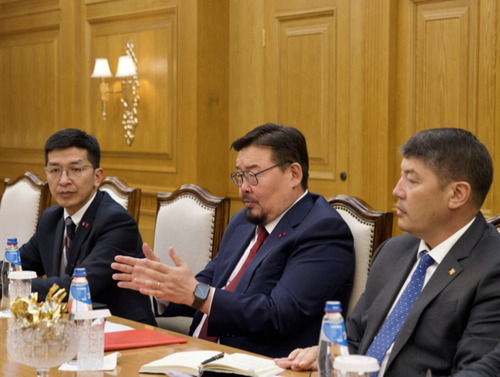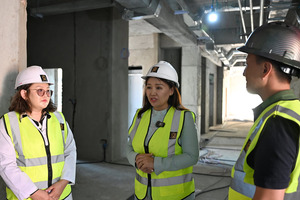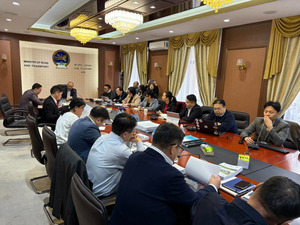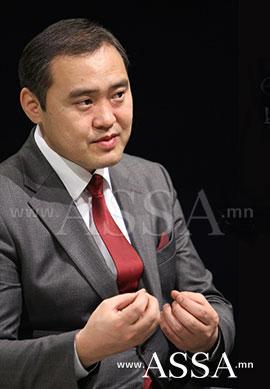 We interviewed L.Gantumur, Minister of Education and Sciences, regarding achievements, reforms and expectations of the sector he leads.
We interviewed L.Gantumur, Minister of Education and Sciences, regarding achievements, reforms and expectations of the sector he leads.
-Probably every person would agree that traditional education contents and quality should be improved. What reform actions has your sector undertaken in the past two years?
-Upgrading the traditional education is an issue not only for our country. The entire world wants to upgrade the education system of the times when information technology and knowledge production were not developed. In doing so, we face several challenges. First, children are obtaining information via various media channels, thus the task is how to ensure children are provided with sufficient amount of other information. Secondly, children now have their own world of spending their time. Our largest challenge is how we could attract their attention to the school overriding various interesting things they get from internet, facebook, twitter and numerous TV channels. Various studies reveal that children anywhere in the world have become not much interested in schools and things taught there. Thirdly, the living has become too easy. Easy living has been “creating” generations that want easy living. The classic example is Japan. The Japanese people have been the most hard-working for generations. Unfortunately, the new generation that enters this society built by these hard workers started losing their ability to fight for life as everything is made ready and easy for them. These people who have been losing their competitiveness skills have faced a challenge to build up this skill in their people. Fourthly, therehas been rapid globalization. The globalization challenges the nations tomaintain their national characteristics. The entire world faced afore-mentioned four challenges how to prepare the next generation that is capable to protect their national interests. Alike all other countries, Mongolia has to overcome these challenges as well. This matter is not a new one that emerged only after this new government was formed. It has been brought up since 1990s.
-That is the time the education sector started shaking. What is the most successfully developed component of the sector since transition to the democratic society?
-The education sector is unique for its continuous improvements and upgrades because education ministersmade significant efforts during their terms to resolve faced issues in timely manner. Education ministers of all times were striving to ensure the education provided in Mongolia is accepted worldwide. When the people started focusing on money due to transition to the market economy, the state’s focus has also changed to this direction. The most important issue was how to create an independent market economy. The result of this policy on education sector was that all educated and skilled ones left the education, research and science sectors. Good teachers started being engaged in small trade. Good school director opened his own company. The skilled human resources left for other sectors leaving the education sector and making it too much weaker. For example, there is no more institution where teachers can upgrade their qualification. The Education Institute has become idle without stable operations. There is an issue of studying the education. Basically, the elite population with high school grades used to choose studying the education but majority of the students who are taking courses in education now to become teachers had grades below average in high school. We are recovering the institution of preparing teachers. We have been paying more attention to the University of Education.
-You spoke up courageously “Every child will be developed”. What is your method of developing every child?
-The most important thing we did in the past two years was the policy to develop every child. The education system will work for every child. In the past we used to issue many policies aimed at all the children and assignments were given only at the theoretical level covering all children. But all children are not the same. They grow in different environments and have different views, interests and worlds. Thus we set a goal to develop every child. Accordingly, we faced an issue of setting the curriculum to develop all these different children who are in the same group, defining the school management that will develop every child and the evaluation system that aims at developing every child, and determining the skills of teachers who will be skilled to develop every child. All these matters are reflected in the renewed program we are developing. We hired an international consulting team on developing this new program. Our principle is that this program should be based on expertise of national researchers and results of well-known international studies. We have been advised that educational reform of Mongolia should be the same reform being done worldwide. In other words, if we copy something done before, it would be outdated quite soon. We can see a clear example from the rapid change and development of cellphones. Similarly, the training technology has been developing and changing very rapidly. Thus, our goal should be what they want and what they want to achieve in Japan, Singapore, Finland and the USA. We try to develop every one of our children, diagnose each of them and make them independent and skilled. They have studies and did some tests in some parts of Germany. Today Japanese are trying to re-direct the education system to ensure that elementary school children learn to make decisions independently and grow up as right persons. We are also trying to do the same thing. We have been cooperating with research teams that have worked on and organized the leading studies and programs in other countries. 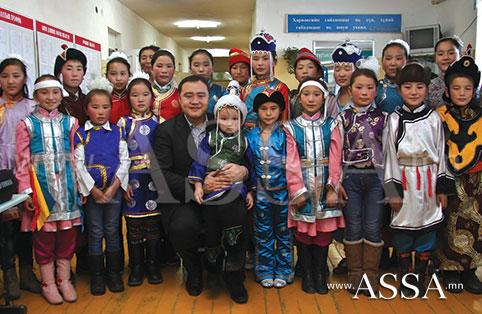
-We are getting closer to the world standards. What changes have you found in children specifically inside the class?
-We are trying to ensure that information given to children at school builds competitive capacity. The important idea to note here is that children are interested in things they actually do themselves, i.e. the child likes and is interested in PC games because he/she plays the games him/herself. No other person is doing it on his/her behalf. Similarly, smaller kids do not watch programs on TV which they do not understand and just leave to play with their toys. In other words, all children want to do something themselves. Therefore, our education program is going to be changed to give time to children to do things on their own rather than the teachers is the only person who speaks for 40 minutes. For instance, out of 40 minutes, 15-20 will be the time for teachers to speak while in the remaining period of time the children will be speaking, creating, doing and assessing. In other words, all children are not required to be able to do the same thing similarly. The most important aspect is that the teachers will define who can do what and based on such diagnosis, the children will be provided with opportunities to develop their skills and knowledge though the things they can actually do. In this case, every child will be developed and improved in different ways and reach the same goal.
-It is said that the children are no longer going to be evaluated with scoring. Does it mean they will be encouraged with a simple word “You are doing good”?
-Encouragement is highly important that teenage kids. Our evaluation system is being directed towards encouragement system. The 6-year olds are encouraged by saying “You did it, you can do it” rather than being blamed for getting bad grades. For example, the children are encouraged with “You have read 10 words in a minute. It is good” and the next time “You read 11 words, it is very good” which serves as a leverage to make the children what they like in the remaining 20 minutes of a lesson. This is the core of the program we are working on. On the other hand, we need teachers who can wait for the children to complete tasks and who can be tolerant. The teachers must not rush the children and wait patiently until the children finish the task. In the past, teachers used to give a minute for a task and if the children could not complete the task within the given time, the teacher used to show how to do it on the blackboard. If someone could complete it, that child would be asked to go to the board and show the others who would just copy form the board. Now, the teachers wait until every child completes the task. But it does not take too much time as the given task is what the children can do. In other words, there is no more cases such as giving the same assignment to all 30 students in a class, 2 of them completes the task before others, 20 would be still working on while the remaining 8 would have not understood the task. We are working on preparing teachers who will be able to diagnose the children. Within the scope of the work to prepare teachers we organized re-training activities for 34 thousand teachers. What we are trying to achieve is not going to be fully realized and put into practice with one training course. We will provide the same re-training every year. In addition, we are working on finding the ways to encourage the teachers as well. The teachers should not only be recognized but also encouraged because the teachers’ labor is the hardest one. We are in transition to a system where teachers are realistically evaluated. Teachers now do not produce paperwork but work with brains of children. We used to say a teacher was a good one as his/her student won an Olympiad. Now, the teachers do self-evaluationas all 30 students are developed and make achievements. The core program is proposed by the Ministry of Education but the teachers retain the right to choose the time and subject of the classes. Schools can also have their own specific features such as special additional classes in certain types of sports, computer, technology or foreign language. We will help the schools to focus on and highly develop what they can do the best. The school directors are also provided with certain authorities. In other words, it is never going to be asuccess to try to manage all processes of teaching 500 thousand schoolchildren throughout the country from the top with one word. Therefore, the schools, the teachers and the schoolchildren will be provided their own authorities and rights. When I say children’s rights, it is not about the right to study or not. It means they will be provided with an environment where they do what they can do at that time. One of the most important actions we are undertaking in this regard is the “Talent” program. 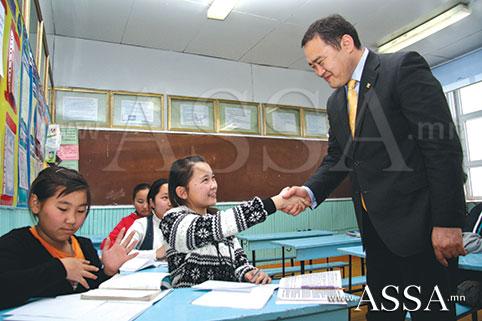
-It seems “Talent” and “Books” programs have beenquite widely implemented. What is the goal of the “Talent” program?
-The “Talent” program aims at assisting children to find out their advantages, become self-confident and reveal various talents such as creativity, sciences and arts. Nowadays, self-confidence has become the most valuable asset required from a person. Through “Books” program, children were involved in the process of making books. This was practice for children that you learn things once you do it. The classrooms established libraries bringing books closer to children. Broad-scope activities were organized letting the children write books. In order to make the children have an aspiration to retain the self, we started implementing “Proper Mongolian Child” program. As part of this Program, we are developing a new program to ensure school graduators know Mongolia very well. The history classes will have more focus on Mongolian spirit as much as possible. Mongolian literature will also have more about Mongolian lifestyle. The children should know all about Mongolian living, national wrestling, horse race, how to set up a ger, what animal husbandry is and who nomadic herders are. We aim at ensuring all children fully know the cultural heritage our nation has preserved until today. We should ensure that our next generations maintain the spirit of a Mongolian person in this globalized world. In this era of knowledge and information, the children will like the school if they are engaged in what they are interested in and can do. In other words, children who play computer games like playing because they can play that specific computer game. Thus, in order to draw their attention towards something interesting in life outside computers, we initiated the programs such as “Talent” and “Books”. The 40-minute class at school should be something the children like and do what they like and are interested in.
-The children will be taught based on what they like. It seems it would require a lot of time to train the teachers in relevant methodologies. When do you think the sector would be developed?
-Timing is not a problem because Mongolia’s number of children is quite low, number of teachers and classrooms are quite sufficient. We are not satisfied only because we compare ourselves with developed European countries or Japan and Korea. In fact, if compared to those countries with the same GDP as Mongolia, we are quite well-developed and established the necessary environment. Thus, we should strengthen and develop what we have already achieved. There are some schools that have classes with three shifts a day. But we do have Mongolian schools, teachers and traditions. In addition, the parents are strongly interested in and making efforts for their children’s education. As the children are provided with their own time, there is no longer a pressure from the teachers’ side. This is the skill that teachers need to acquire, and once they are acquired, the teaching life will become more and more interesting. Accordingly, there would be no pressure on theministries, aimag and district educational agencies and the schools. We are providing our full support to teachers to ensure they acquire such skills. We aim at attracting secondary school graduators with high grades to the educational institutes as much as possible and providing an opportunity to those with high grades to study at the University of Education free of tuition fees. The students majoring in education will now have to have 4 times of internship during the university years. We opened a laboratory school at the University of Education. This means the generation with knowledge and skills on this new know-how and teaching methodologies is being prepared at the moment. These students in cooperation with the currently working teachers with 5-10 years of work experience will definitely develop the sector. Every teacher and every student will be given their own responsibilities and when the proper mechanism is put in place, the sector itself will find its proper course. This spring we saw the results of operations of our 40 laboratory schools. The new program was tested and its results and performance of teachers were evaluated. The three procedures, i.e. revealing talents, understanding children and making them do what they like, together make it easier for everyone, the teachers, schools and the Ministry. We expect to see the positive results of our activities quite soon. 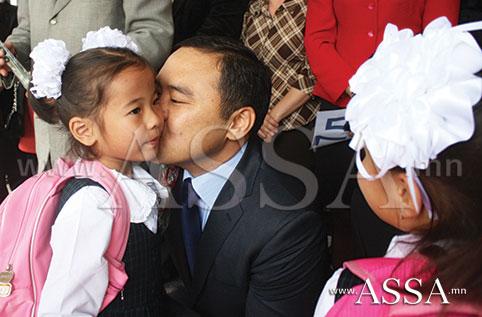
-Implementation of these programs requires significantly large funds. How does the current economic situation affect your sector?
-Regardless of Mongolia’s economy situation, i.e. whether or not it has money, the education sector will maintain the schools. There are, of course, certain needs for funding. But we believe we can do sufficient reform with then currently available funds. When we visit the schools the directors informed how many millions of tugrugs they spend on school repair and painting, or how much they need for the school or how bad their school buildings are. In other words, what they said used to be only household matters. Since I took the office, I have been telling the school directors only one thing. It is “Tell me only about how many and which children have revealed or found out their talents and what good things happened at your schools”. Now the school directors talk only about their schoolchildren. E.g. “500 children attended after class courses. 200 children found out what their talents are. Students with certain lags have caught up with the others in such way. We have helped out the students who were unable to purchase uniforms”, i.e. they talk about children only. When we talk about children, life goes on regardless of whether or not we have funds. When we are unable to resolve financial problems, we try to stop everything going on in our lives. But financial processes emerge during the life processes. The new generation emerged from our current educational system will create their own economy. Thus, our largest goal is to “produce” a good generation. This new generation will contribute in development of financially capable Mongolia. We will make all our efforts within the available funds.
-We definitely believe that our economy will improve in the future. However, we still have the need to build new schools and kindergartens in the nearest future. How is this issue being resolved?
-In any case we will direct all our resources to build schools and kindergartens. We are currently working on resolving the issue of concession. Under the concession agreement, the investors have been making proposals to build new schools and kindergartens. Although we are somewhat behind in terms of timing, I do believe we will resolve the issue of construction of school buildings. The current failures will be corrected tomorrow. We are denying our past beliefs we had until today which was “There would be no lags if there are less than 20 children in one class”. We will prove that even if there are 38 children in one class we will be able to teach them. All children can be at the same level if we analyze and define every child and let them do what they can, even if there are 40 students in one class. Financial issues would not matter. The only issue would be increasing the salary of teachers.
-What is the status of resolving the issue of building complex schools?
-This year we will resolve the issue of building complexes of schools and kindergartens. Children will attend the schools and kindergartens from the walking distance. They will study in one class in the same environment from the kindergarten until they graduate the elementary grades. Then in middle school, the policy will be directed to each schoolchild which means every child will be given attention regardless of their transfer from other schools.
-Every year we have more and more unemployed who have diplomas. What do you think the cause of this? What is the improvement in quality of universities and colleges?
-There are several reasons that graduators of universities and colleges are being unable to find the work place to work in the fields they were majored. First, the quality of graduators is not being sufficient, i.e. we are not being able to prepare the workers to the level sufficient to find their professional work places independently. Second, the structure of the economy of Mongolia is not yet a system to absorb the persons with higher education. The Mongolia’s economy today depends on livestock, trade network and mining only. How many lawyers and economists would work in the country with this structure? In other words, the current economy is not the structure where highly educated people would be able to work. This structure of the economy needs to be fixed. Next issue is that the universities and colleges need to become scientific research institutions. The students should be provided with new knowledge, otherwise they would not be able to enter the new markets. Thus, we are directing our focus towards the quality of education. The universities and colleges will be turned into research institutions which will create enormous amount of knowledge in economics at the market. We are trying to realize these three things as a complex. It is hard to resolve them mechanically. 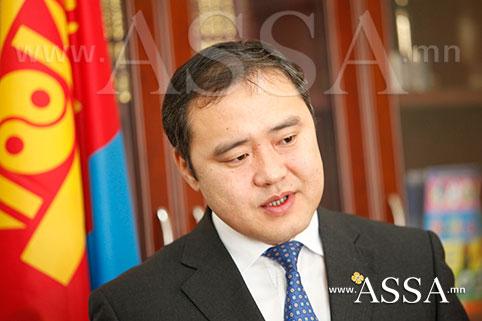 -The education sector is in the middle of active reform. There are concerns that closely related research and scientific activities have been left behind.
-The education sector is in the middle of active reform. There are concerns that closely related research and scientific activities have been left behind.
-There are two different views not related to sciences. The people ask where the results of financing made in sciences. But researchers say they have been working hard and ask where the financing is. In other words, the people’s demand is to see the results sooner while the scientists say the results will be given some day. These two varying views reportedly cause the delay in development of the sector.
-What is the cause of this situation?
-There are two reasons. First, the assignments given to scientists were wrong. The government says it gave its assignments but the scientists were working on their own matters. For more clarity, the scientists have been choosing what to study. In this case, the researchers focus on continuing their studies and are never concerned about anything else. And while they are kept busy with their studies, the world scientific research takes a different path. Second, there have been an attempt to resolve the issues in Mongolia only. And when they faced issues resolved in other countries, they tried to copy their practices which is not scientific research at all.The scientist is a person who should find a new resolution but not the one works only for the self or who copies others. This is the reason we ended up in this situation.
-How could we come out of this dead-end?
-We first need to make sure the given assignments are correct. In order to do so, our scientists should directly work on assignments of studies carried out by world scientists. Now we are entering the international research system directly. This will bring our assignments to the world level. Another reason for coming to the dead-end is that the modern science resolves the issues with technical force. The traditional science is based on observation, i.e. it would take 5 years to find the results of uniting two cells. But with modern technologies, it is a matter of only a minute. We have no modern equipment. It can be compared as driving up the hill on an old Russian jeep UAZ 469, i.e. Mongolian scientists, with driving on the same hill on Lexus 570. The Lexus engine is strong with high driving capacity, thus it will have no problem to drive up the hill while “we” on an old Russian jeep will stop on the way as our engine would not bear the load. This is our difference. Therefore, we say let us direct our scientific research assignments to the world level, and let our scientist use the modern equipment and tools that are used by other scientists of the world. Moreover, our scientist should acknowledge that “Science is managing and leading the mankind”. The industry or trade is not the one that is leading and managing the country nor the arms, machinery or military force. What is leading the world is pure scientific discoveries. The industries only follow and are “fed” by scientists. Thus, in order to achieve the world development level, we need to catch up such development. And in order to do so, we need to have a state policy to support the sciences and bring them up on their “feet”. In other words, we have to conduct world level studies in Mongolia, e.g. how we could treat cancers or diabetes. We need to study the things that have not yet been resolved in other parts of the world. We need to create totally new trends of sciences. Thus, we need to have an economics policy that acknowledges the sciences are the “leaders and managers” of development. This is an enormous amount of wealth. Unfortunately, most of our scientists are currently living abroad. The reason they are not coming back to Mongolia is clear. There are no laboratories, equipment or assignments in Mongolia.
-The draft state policy of the science sector has been submitted to the Parliament, hasn’t it?
-The policy document to apply to the sciences has been drafted and submitted to the Parliament. Once this policy is adopted, we will start working on establishing the structure and organization of the sciences. There is one action that will be forced to be implemented in this structure which is establishment of a world-level laboratory. The first investments should be dedicated to this action. Our government is working on establishing an anatomic living cell laboratory this year. Once this laboratory opens, we will have the opportunity to invite world-level researchers and scholars of cancer and cells to work in Mongolia. This means, some of the young Mongolian scholars working abroad will be back to their motherland. They might even invite and bring their fellow researchers of other countries with them to Mongolia. This means, with use of this laboratory, they will have an opportunity to work on resolving issues related to cancer treatment which has been a world-wide issue. The government should be responsible for risks and establish 5-10 world-class laboratories. In addition, the scientific research works could be exempt from taxes or could be supported based on newly issued internationally accepted procedures. If these types of strict and soft infrastructure is established, within only 10 years we will start gaining the benefits of sciences at the same amount as the current mining industry. There are many countries in the world that make enormous profits from sciences. Because of the amount of profits, such countries are being able to spend a lot for scientific research works because the need to spend a lot to make more income. Thus, in order to gain some portion of the benefits from the world markets, i.e. benefitsof sciences, we need to establish the scientific research basis.





